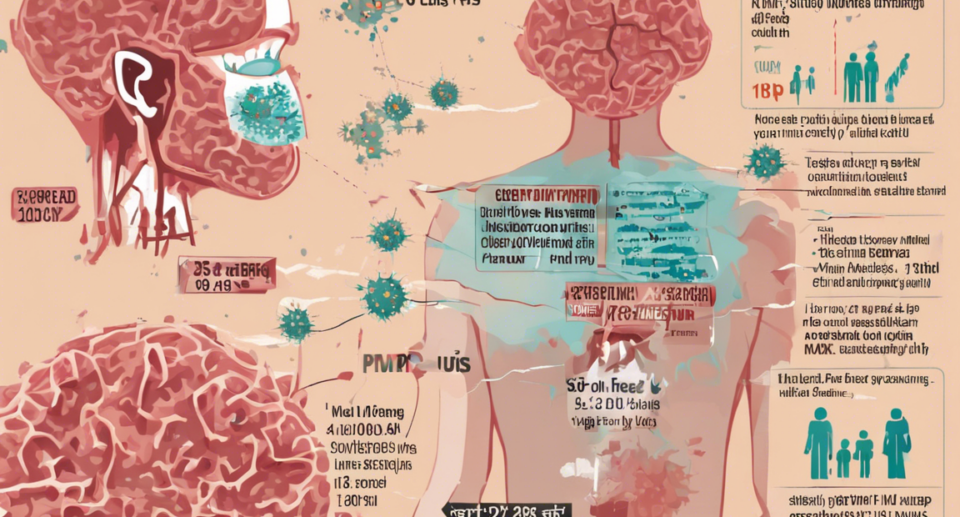Mumps Virus Outbreak: Delhi’s Health Crisis

Introduction
In recent months, Delhi has been facing a significant health crisis due to an outbreak of the Mumps virus. This contagious viral infection primarily affects the salivary glands and can lead to serious complications if not properly managed. In this article, we will explore the causes, symptoms, diagnosis, treatment, and prevention of the Mumps virus to help raise awareness and combat the current outbreak in Delhi.
Understanding the Mumps Virus
Mumps is caused by the Paramyxovirus and is highly contagious, spreading through respiratory droplets or saliva of an infected person. The virus primarily affects the salivary glands, leading to swelling and pain, particularly in the parotid glands located between the ear and jaw. While the Mumps virus primarily targets the salivary glands, it can also affect other organs such as the brain, pancreas, and testes in males.
Symptoms of Mumps Virus
- Swelling and pain in the salivary glands
- Fever
- Headache
- Muscle aches
- Fatigue
- Loss of appetite
Diagnosis and Treatment
Diagnosis of Mumps is usually based on clinical symptoms, such as swelling of the salivary glands and a history of exposure to the virus. Blood tests can also be conducted to detect the presence of Mumps antibodies.
There is no specific antiviral treatment for Mumps, and the infection is typically managed with supportive care, including rest, hydration, and pain relievers. In severe cases or complications such as meningitis or orchitis, additional medical intervention may be required.
Prevention Strategies
Vaccination is the most effective way to prevent Mumps and its complications. The MMR vaccine, which also protects against measles and rubella, is routinely administered during childhood. Booster doses of the vaccine may be recommended for adults at increased risk of exposure.
Other preventive measures include practicing good hand hygiene, avoiding close contact with infected individuals, and staying home when ill to prevent the spread of the virus.
Impact of the Mumps Outbreak in Delhi
The recent Mumps virus outbreak in Delhi has put a significant strain on the healthcare system, with a surge in cases reported across the city. Schools, colleges, and other public places have been identified as hotspots for transmission, leading to concerns about the rapid spread of the virus.
Health authorities in Delhi have been working to contain the outbreak through vaccination drives, public awareness campaigns, and quarantine measures for infected individuals. However, continued vigilance and community cooperation are essential to curbing the spread of the virus and preventing further outbreaks.
Frequently Asked Questions (FAQs)
- What are the main symptoms of Mumps?
-
The main symptoms of Mumps include swelling and pain in the salivary glands, fever, headache, muscle aches, fatigue, and loss of appetite.
-
How is Mumps diagnosed?
-
Mumps is typically diagnosed based on clinical symptoms such as salivary gland swelling and a history of exposure to the virus. Blood tests can also detect Mumps antibodies.
-
Is there a specific treatment for Mumps?
-
There is no specific antiviral treatment for Mumps. Supportive care with rest, hydration, and pain relievers is usually recommended.
-
How can Mumps be prevented?
-
Vaccination with the MMR vaccine is the most effective way to prevent Mumps. Good hand hygiene, avoiding close contact with infected individuals, and staying home when ill can also help prevent transmission.
-
What are the complications of Mumps?
-
Complications of Mumps can include meningitis, orchitis (inflammation of the testicles in males), hearing loss, and pancreatitis.
-
Who is at risk of Mumps infection?
-
Unvaccinated individuals, children in crowded settings such as schools and daycares, and those with weakened immune systems are at increased risk of Mumps infection.
-
Can adults get Mumps if they were vaccinated as children?
-
While the MMR vaccine is highly effective, some individuals may still contract Mumps, especially if they were only partially vaccinated or if immunity has waned over time.
-
Is Mumps a serious disease?
-
While Mumps is usually a mild illness, it can lead to serious complications such as meningitis or orchitis, particularly in adults or unvaccinated individuals.
-
How long is a person with Mumps contagious?
-
Infected individuals are typically contagious from a few days before the onset of symptoms until about nine days after the salivary glands begin to swell.
-
What should I do if I suspect I have Mumps?
- If you suspect you have Mumps, contact your healthcare provider for guidance. Stay home to prevent spreading the virus to others and follow their recommendations for care and monitoring.
In conclusion, the Mumps virus outbreak in Delhi serves as a reminder of the importance of vaccination, good hygiene practices, and prompt medical attention in preventing and managing contagious diseases. By raising awareness, implementing preventive measures, and collaborating with healthcare authorities, we can work together to combat the current health crisis and protect the well-being of our community.





